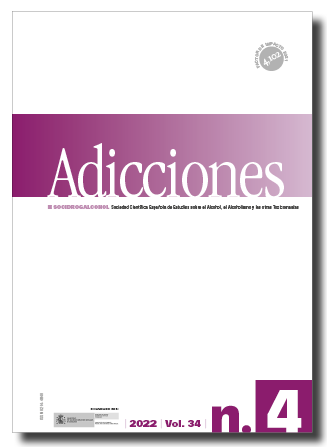Asistencia a un tratamiento para dejar de fumar con personas con trastorno por uso de sustancias
DOI:
https://doi.org/10.20882/adicciones.1718Palabras clave:
Barreras, no asistencia, dejar de fumar, tratamiento cognitivo-conductural, desórdenes por el abuso de sustancias.Resumen
Este estudio aporta evidencia para entender las tasas de no asistencia en fumadores con TUS asignados a un tratamiento de cese del tabaquismo. Los hallazgos indican que era más probable la no asistencia al tratamiento de los pacientes más jóvenes, en tratamiento por uso de cocaína, y con un menor número de días en tratamiento por uso de sustancias. Futuros ensayos de cesación tabáquica con esta población difícil de tratar deberían tener en cuenta la incorporación de estrategias para mejorar la asistencia y las tasas de retención. Esperamos que esta información sea útil para profesionales de la salud en su diseño e implementación de intervenciones para reducir las enfermedades relacionadas con el tabaquismo entre la población con TUS.Citas
Aonso-Diego, G., González-Roz, A., Krotter, A., García-Pérez, Á. & Secades-Villa, R. (2021). Contingency management for smoking cessation among individuals with substance use disorders: In-treatment and post-treatment effects. Addictive Behaviors, 119, 106920. doi:10.1016/j.addbeh.2021.106920.
Brorson, H. H., Arnevik, E. A., Rand-hendriksen, K. & Duckert, F. (2013). Drop-out from addiction treatment: A systematic review of risk factors. Clinical Psychology Review, 33, 1010–1024. doi:10.1016/j.cpr.2013.07.007.
Cooper, A., Kline, A. C., Baier, A. L. & Feeny, N. C. (2018). Rethinking research on prediction and prevention of psychotherapy dropout: A mechanism-oriented approach. Behavior Modification. doi:10.11177/0145445518792251.
Garey, L., Rogers, A., Manning, K., Smit, T., Derrick, J., Viana, A.,… Zvolensky, M. (2020). Effects of smoking cessation treatment attendance on abstinence: The moderating role of psychologically based behavioral health conditions. Journal of Substance Abuse Treatment, 109, 1–7. doi:10.1016/j.jsat.2019.10.006.
Lappan, S. N., Brown, A. W. & Hendricks, P. S. (2019). Dropout rates of in-person psychosocial substance use disorder treatments: A systematic review and meta- analysis. Addiction, 115, 201–217. doi:10.1111/add.14793.
Lien, L., Bolstad, I. & Bramness, J. G. (2021). Smoking among inpatients in treatment for substance use disorders: Prevalence and effect on mental health and quality of life. BMC Psychiatry, 21, 244. doi:10.1186/s12888-021-03252-9.
Martínez-Vispo, C., López-Durán, A., Rodríguez-Cano, R., Senra, C. & Becoña, E. (2021). Treatment completion and anxiety sensitivity effects on smoking cessation outcomes. Addictive Behaviors, 117, 106856. doi:10.1016/j.addbeh.2021.106856.
McCrabb, S., Baker, A. L., Attia, J., Skelton, E., Twyman, L., Palazzi, K.,… Bonevski, B. (2019). Internet-based programs incorporating behavior change techniques are associated with increased smoking cessation in the general population: A systematic review and meta-analysis. Annals of Behavioral Medicine, 53, 180–195. doi:10.1093/abm/kay026.
Naslund, J. A., Kim, S. J., Aschbrenner, K. A., McCulloch, L. J., Brunette, M. F., Dallery, J.,… Marsch, L. A. (2017). Systematic review of social media interventions for smoking cessation. Addictive Behaviors, 73, 81–93. doi:10.1016/j.addbeh.2017.05.002.
Whittaker, R., McRobbie, H., Bullen, C., Rodgers, A., Gu, Y. & Dobson, R. (2019). Mobile phone text messaging and app-based interventions for smoking cessation. Cochrane Database of Systematic Reviews, 10, CD006611. doi:10.1002/14651858.CD006611.pub5.








